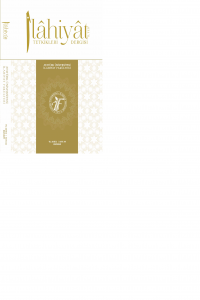Ömer Nasuhî Bilmen’in Hikmet Gonceleri Adlı Eserinde Fars Edebiyatından Yapılan Alıntılar ve Kaynakları
Abstract
Ömer Nasuhî Bilmen, daha çok dinî ilimler alanındaki eserleriyle temayüz etmis bir din
âlimi olmakla birlikte, edebiyat alanında da çesitli eserler telif etmis bir ediptir. Arap, Fars ve
Türk edebiyatları alanlarında derin bir birikime sahip olan Bilmen, dinî ilimler ile ilgili
eserlerinde de bu birikimini degerlendirmis ve dinî konuları açıklarken zaman zaman Arap,
Fars ve Türk edebiyatlarından bazı alıntılara yer vermistir. Dinî ilimlere dair olan eserleri
arasında edebî birikimini en çok yansıttıgı kitabı hadis alanında kaleme aldıgı Hikmet
Gonceleri’dir. Çalısmamızda Ömer Nasuhî Bilmen’in bu eserinde hadisleri açıklarken Fars edebiyatından
yaptıgı alıntılar ele alınmıstır. Bu alıntıların Farsça metinleri Fars alfabesiyle,
okunusları da transkripsiyon alfabesiyle verildikten sonra Türkçe çevirilerine yer verilmis ve
bunların kaynakları önemli ölçüde tespit edilerek belirtilmistir.
Quotations From Persian Literature in The Work of “Hikmet Gonceleri” (Buds of Wisdom) of Umar Nasuhi Bilmen and their Sources
Abstract
Although Umar Nasuhi Bilmen was distinguished as a scholar of religious sciences, he is at the
same time the author of several literary works. He has a broad repertoire in the fields of Arabic,
Persian and Turkish literatures and thus he benefited from this broad knowledge in his religious
writings. In this regard, some quotations from Arabic, Persian and Turkish literatures occasionally
appear in his works while explaining religious matters. Among his works concerning religious sciences,
“Hikmet Gonceleri” (Buds of Wisdom)$ is his book on Hadith in which he reflected his
literary repertoire to the utmost degree. In our study, we have dealt with the quotations from
Persian literature that he utilized while explaining the hadiths. The Persian texts of these
quotations were given in Persian alphabet and their pronunciations were displayed with
transciptional alphabet, and also Turkish translations of them were added. In this study we stated
sources of these Persian quotations detected to a great extent.
Details
| Journal Section | Research Articles |
|---|---|
| Authors | |
| Publication Date | December 30, 2015 |
| Submission Date | October 30, 2015 |
| Published in Issue | Year 2015 Issue: 44 |
Cite
Journal of Ilahiyat Researches is licensed under a Creative Commons Attribution-NonCommercial-NoDerivatives 4.0 International License.


